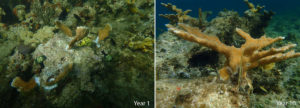In 2008, Dr. Craig Dahlgren of the Perry Institute for Marine Science and a team from Disney’s The Seas with Nemo and Friends aquarium at Epcot in Orlando began conducting experimental coral restoration on reefs between Disney Cruise Line’s Castaway Cay and the settlement of Sandy Point in South Abaco. In 2007 reefs were assessed and found to be degraded due to past bleaching events, disease and other factors. Live coral cover was low and there was little signs of resilience or recovery. Based on this initial assessment a strategy was developed to build resilience by restoring grazing urchins to experimental reefs and promoting recovery of staghorn and elkhorn populations through transplantation. After initial experimental transplantation of corals, an experimental coral nursery was established in 2011, the first in The Bahamas. Since then, the nursery has produced thousands of elkhorn and staghorn corals for outplanting to restore reefs, and monitored over time.
Above: Year 1 outplanted Elkhorn corals vs Year 10 outplanted Elkhorn coral.
The project has supported critical experiments have been conducted to improve coral nursery design, examine best practices for outplanting, monitor the efficacy of restoration at the scale of the individual coral colony to that of the reef ecosystem, study the impact of coral predators on success of restoration, examine how different genetic strains of corals grow and survive under different conditions and examine the interaction between coral restoration and restoration of the key grazing species on Caribbean reefs, the long-spined sea urchin, Diadema antillarum. On reefs where all of the Elkhorn and Staghorn coral had died off, dozens to hundreds of colonies survive and thrive. We have also experimented with transplantings of other endangered coral species like the pillar coral, Dendrogyra cylindrus. At present long-term datasets are being analyzed and their results used to improve the science of coral restoration.
In addition to benefitting the reefs of South Abaco, this program was the foundation of wide reaching programs such as the Reversing The Decline of Bahamian Coral Reefs program and the Reef Rescue network. As we move into the next decade of research in South Abaco, we will be incorporating new studies to advance our understanding of coral restoration science and monitoring. We are also proud to use this program as a model for the interaction between marine scientists and businesses to work together to improve the health of our marine environment.


